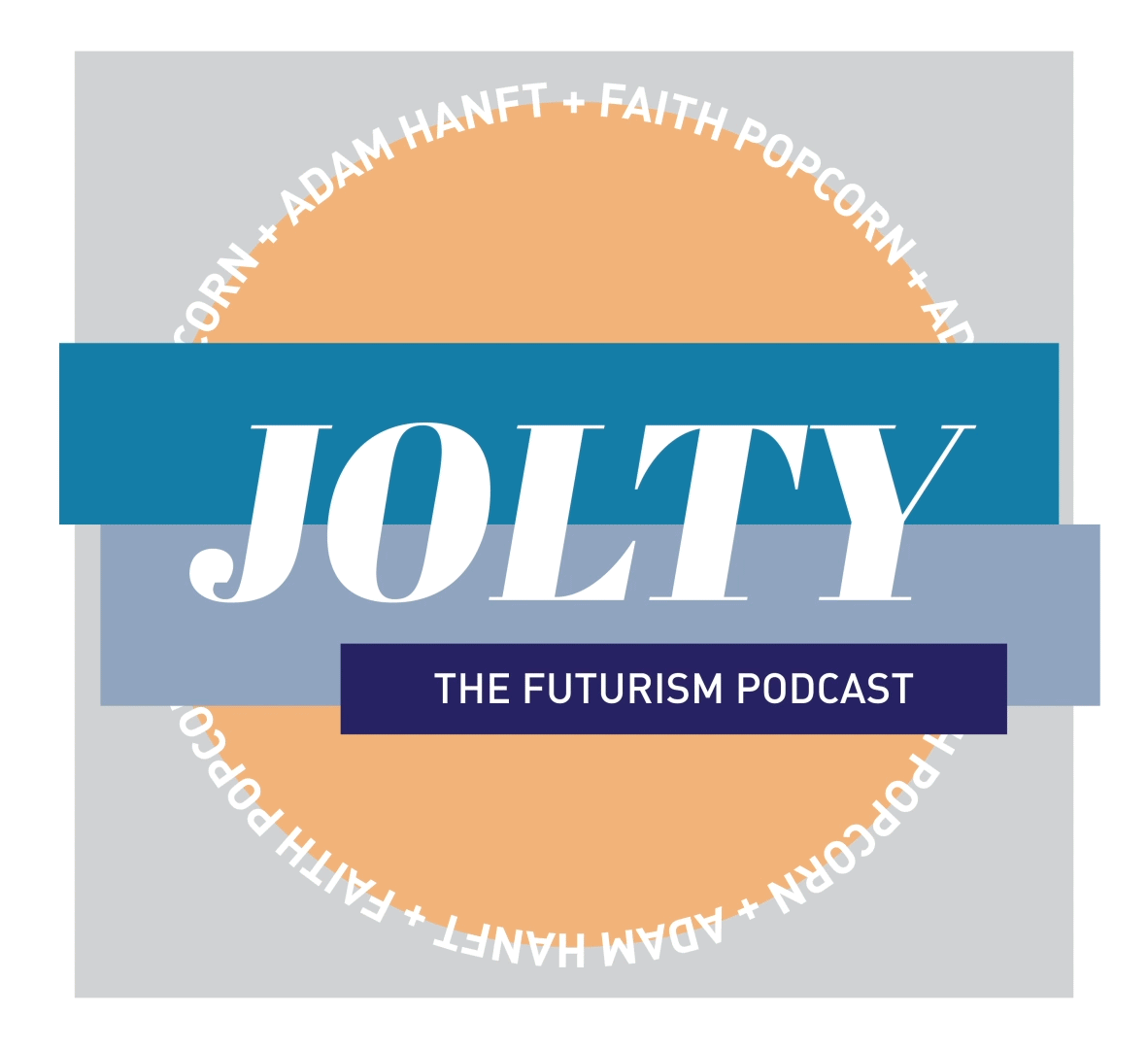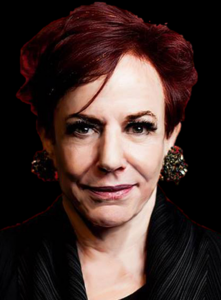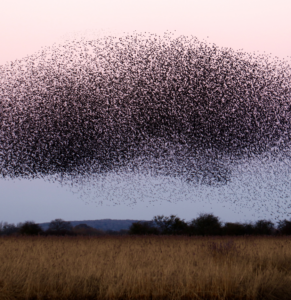March 29th, 2021
With so much uncertainty in today’s world, one can’t help but question everything- from politics and pandemics, to social justice and social media, it’s hard to know who to listen to, and even more so, who to trust. But have you ever questioned your spirituality? Or even the existence of God? Today, Jolty is happy to welcome John Follis, director of the documentary ‘Leaving God’. Adam, Maggy, and Faith join John to share their perspectives on religion, government involvement in our faith, and John’s film as well. Let’s Jolt!!
Transcript
Maggy Wilkinson: Welcome to Jolty. I’m Maggy Wilkinson, joined today by our hosts, proven futurists and good friends, Faith Popcorn and Adam Hanft.
Faith Popcorn: With so much uncertainty in today’s world, one can’t help but question, well, everything. From politics and pandemics to social justice and social media, it’s hard to know whom to listen to or even more so whom to trust. But have you ever questioned your spirituality or even the existence of God? Today, Jolty is happy to welcome John Follis, director of the documentary, Leaving God and with that, let’s jolt.
FP: Hello, John.
John Follis: Hello John.
FP: Let me introduce you to Maggy Wilkinson.
MW: Hi there.
FP: John, it’s just so nice to see you. And I was so interested in the movie, and so I was so happy to have you on.
JF: I’m thrilled to be on.
FP: So John, introduce yourself to our fabulous audience and tell us what you’re about in a couple of minutes.
JF: Okay. Well, first, thank you again for having me.
FP: Pleasure.
JF: I’m thrilled to be here. I love the idea of your podcast.
FP: Thank you.
Adam Hanft: Yeah.
JF: My background is in advertising. I spent pretty much my entire career in advertising in New York, working for and getting fired from some of the best agencies in the city until I…
FP: I got fired a lot too. I know how that feels.
AH: Not that much really.
FP: Okay, go ahead, continue.
JF: I started my own agency. And then I was a marketing person. I was doing consulting online for small businesses around the country. And then after 10 years of doing that, I gave myself permission to switch gears and focus on whatever I wanted to do. And that was during the time where I had been getting more involved in video. I started a new business in 2013 called Big Idea Video. And shortly after doing that, I started creating more long-format storytelling videos. After a couple of years of doing that, I started thinking about the documentary Leaving God because that has always been an interesting subject for me. Pretty much my entire life, I’d been asking questions about God and trying to figure things out. So that’s kind of how I arrived at Leaving God in 2017.
FP: Wow, interesting.
AH: So did you make this movie mainly for you as a working through process, or did you hope it would lead other people out of the cathedral?
JF: You know, that’s a good question Adam. My hope was that the theme of it was interesting enough that people would find it interesting to watch. I think any time you make a documentary that dovetails with a personal story, there’s a personal element to it. But I definitely created it hoping that it could get out and be seen by as many people as possible.
AH: Right. But beyond just viewership were you hoping that people would internalize the message, question their own faith and maybe follow your path? Would that be… Was that a goal that you had in mind?
JF: The goal of it was to get people to think, not to do anything in particular. I have to keep reminding people, despite the title of the documentary, it’s not an anti-God film. It’s not intended to drive people away from God. It’s merely to share some of the things that I discovered in my 40-year search for God and reveal some of the conclusions that I came to. And throw those out to people to maybe get them to re-evaluate their own perspective.
FP: Yeah, so how were you raised? In what religion or how… What was your religious training?
JF: Well, I was raised Catholic and went to Catholic school, Catholic junior high.
FP: And your family was church-going?
JF: Right. As most Catholics of that generation, we went to school… We went to church on Sunday, until I hit my high school years and started to rebel against that. My parents didn’t really put up a lot of resistance to that. They were kind of feeling ambivalence themselves, although they never really wanted… I don’t think they would ever admit that.
FP: Right.
JF: But shortly after I stopped going, it wasn’t long thereafter that they started having reasons to not go to church.
AH: They thought they were going for you on some level. And then when they realized that they weren’t going for you, they became less involved themselves?
JF: You know, that’s a projection, maybe.
FP: Well, you know, a lot of things we do like staying married, we say we’re doing it for the children anyway.
JF: Right.
FP: So Maggy, you had a great question before we got on.
MW: John, thank you. I appreciate your background. I’ve got a question about stories and myths. And I’m gonna provide just a little background to provide some context with that, which is I actually studied at the Vatican in my early 20s. And the priest that was my teacher was a Carmelite monk who was the Vatican Latinist. He was interviewed in the movie, Religulous, Bill Maher’s movie.
JF: I love that movie.
MW: And I think he was one of the few people that made sense in that movie because he’s being interviewed outside the Vatican gate and asked about all the crazy stories that make up the religion, a virgin birth, things like the assumption, think of things that are… Miracles. And he said, “Well, friends. Those are just stories. They’re just myths.” And it reminded me a little bit of Bill Moyers and the Power of Myth. And do you think that these stories or these myths can point to a truth and that they’re important directionally or no, that they really don’t serve any purpose?
AH: So whether we believe that the Red Sea parted or not, to some degree it’s comforting to have that fable as a paradigm of transcendence and escape and rebirth. So I think what Maggy is saying is, whether or not we literally adhere to the myths or they’re a part of our lives, when you left God, you didn’t leave the power of myths as a guiding principle, right?
JF: You know, if I may, I think one of the most interesting things about this and really the catalyst for me for making the film was when I discovered The Clergy Project. Because I was going through a lot of self-reckoning of my own religious beliefs, I started to imagine and believe that there had to be some people in the clergy, priests, rabbis, ministers, whatever you wanna call them, who also may have been going through a re-evaluation of their beliefs. So when I discovered that there was actually some research done by Linda LaScola and Daniel Dennett on that subject and started reading some of the stories of these ministers and priests who were just going through incredible emotional struggle with the fact that for their entire lives, they identified as being a conveyor of the wisdom of God and would preach the word of God on a weekly basis to hundreds and hundreds, thousands of people over time, were starting to realize that maybe it wasn’t true. It kinda answered my question about whether or not there were priests and ministers that were coming to that conclusion so this is a major cultural shift. I think, over the coming years, you’re gonna find more and more… Not just average people but more and more priests and ministers, and how do you find work after coming out as no longer a priest or a minister, you…
AH: Other than Faith and I and Maggie would hire them, they don’t…
FP: Yeah, right.
AH: Really have employment prospects.
JF: It’s kind of hard to find work as a priest or minister no longer believes.
AH: It’s interesting ’cause that relates also to the other side of the funnel which is recruiting priests, ministers and so forth. One of the reasons that the church is at all healthy is because of the third world, that’s why we’re seeing South America and Africa being where the growth is and that’s where the cardinals and so forth are being appointed from.
JF: Well, the church follows the same model as Philip Morris. They start selling cigarettes wherever they can, and then when people get smart and stop smoking, then they go to third world countries.
AH: Exactly, I think that’s a good analogy. I think it’s true. Look in Western Europe, compared to the West, churches are empty, right?
JF: Oh yeah.
AH: The [0:08:40.2] ____ population in Western Europe is dramatically higher than in the US.
JF: Absolutely, yeah, there’s research done that the US is the most religious industrialized country in the world. The reason for that is the subject of a post I put up on LinkedIn a couple of years ago, in doing my research, I discovered the ad campaign commissioned by the Eisenhower administration. Do you know… Do you guys know about this?
FP: No, tell us.
JF: I forget, it was given a name and they actually… Billy Graham was a good friend of Eisenhower and had his ear and would talk to him on a regular basis, and this was right at the beginning of the Cold War when the biggest fear was that we were gonna be annihilated by the godless Soviet Union. And the key word in that phrase is godless because the Soviet Union was atheist, and they made no bones about that. So as a strategy to get the American public unified against the scary Soviet Union is they created this campaign that was all about God. They called it the godification of America, and it was… That’s when… Every time you look at a dollar bill or look at a coin, what do you see? In God, We trust. You walk into a government building or a courtroom In God, We trust. I always wondered where that came from.
FP: Yeah, how does that stay there. Right.
JF: So that In God, We Trust was a direct thing that came out of the godification of America against the godless Soviet Union. If you grew up in the ’50s, you were just inundated with messages about God and going to church, they did… You’d go to a drive-in movie, in addition to getting snacks and stuff, they would stick in a commercial in the drive-in that says have you gone the church this Sunday? So the budget, I think this was like in 1952, the budget was something like $8 million which…
JF: Wow.
JF: In today’s dollars would be something like $87 million, and they did this campaign for like five years. This is why our country is so steeped in religion versus the western… The countries in Europe.
AH: I think it was during the Eisenhower administration that one nation under God became… The under God part…
JF: That was part… That was exactly part of it, and they stuck that, they stuck that into the… And a lot of this really is a conflict of interest because our constitution, I think, is pretty specific about separation of church and state. So I think if they tried to do stuff like that now… The problem is undoing it.
AH: Exact words. Honestly, I think the court now is far more supportive of the religious integration into American life than even probably it might have been during Eisenhower, but certainly now, you’re not gonna find many people in the six to three court saying take down the Christmas tree in front… Or the menorah for that matter in front of the Post Office.
JF: But that explains why this country is so religious because that was one of the most effective campaigns ever done that no one knows about.
FP: Yeah.
AH: Yeah, I think that’s true. And I think also part of our founding mythology in terms of the Puritans and the role of religion in life is pretty powerful and it’s ironic. In the UK, there’s a chief rabbi. We don’t have that, which is an official position, we don’t have a chief rabbi in the US obviously. So in some ways, religion is more formalized in Europe, and yet at the same time, it’s more pervasive here, sort of interesting dichotomy.
JF: Yeah, when you think about it, when you sneeze, what do you say? God bless you.
FP: Right, right.
JF: I mean, as I pointed out in my film, it’s so baked into our DNA.
FP: What would be the antidote to this? What would you have to be different if you’re talking about how pervasive, do you think it is harmful in some way to society that it is and that there’s a better way?
JF: I think when it starts… Yeah, you look at what’s happening in this country and what happened just last month with the insurrection and the strong connection between the conservative radical powers in this country and religion, and it’s hard not to think that there isn’t a connection between the two. That’s where it becomes a problem when they start getting involved in our government and start making decisions about women’s bodies and you know things like that, when it becomes a problem, I think…
MW: Is it a problem around the Christmas table though? For Christmas dinner?
JF: I don’t think it’s a problem with Christmas trees. You know, I mean there’s a lot of good that comes out of a Christian Judeo tradition, you know loving your neighbor and things like that, so you can’t say all religion is bad, it’s just that it’s really the radical aspects of it that become a problem. I don’t really care what other people think or do as long as they don’t fuck around with me.
AH: What’s interesting is the change that’s happened in this country since the Vietnam war. So go back to that period. Some of the most anti-war, anti-establishment, leftist politics came from the Church, Daniel Berrigan and his ilk, priests like that. Now, you rarely see that. Maybe you do in the third worlds. I think we’ve seen a politicization of the Catholic Church over the last couple of decades, and I think it’s very much related to the rise of Reagan-ism as well, but there’s a long history of labor activism and anti-war activism on the part of the Catholic church and priests.
JF: Yeah, and look at the Civil Rights Movement and Martin Luther King, The Reverend Martin Luther King, that’s an example of where religion has helped society, I think.
FP: Well, how can people, especially like Catholics, go on with all the you know child abuse they found in church?
JF: Since, I’m not Catholic and haven’t considered myself Catholic for a long time, it hasn’t affected me the way other people who are Catholic, I suppose, but…
FP: I think it has affected everybody that ever believed in anything.
JF: Yeah, but this is one of the… It just contributes to this trend that is happening despite that of people not… Walking away from traditional religion, especially the millennials. If you wanna look at trends, you just compare baby boomers to millennials, and 75% of baby boomers say that they are Christian. And now it’s only about 50% of baby boomers. So you know it’s going away from traditional religion of any kind of religion.
AH: I think if you’re devout, if I was a devout Catholic and I was living through the scandal, I think there are two options. One is, you say, “I’m done, there’s too much hypocrisy, it’s the equivalent of institutional racism, institutional tolerance, that went to the top. I don’t wanna be a part of it.” Or you say, “I believe too much in the underlying principles to leave, I’m gonna stay and make it better.”
JF: Kinda like being in the Trump Administration.
FP: I was gonna say that. I was just gonna say that. They just say that they must be lying. So…
AH: The rationale… I think those who stay in the Trump administration, were inside the system, and their argument was that, “I could do more for the country by being inside than outside.”
FP: Yeah, they said that, right?
AH: That’s a different argument that says, “I’m gonna take down the Catholic establishment and rebuild it, ’cause I believe in the fundamental pre-sets of it.”
FP: Oh, here’s something. Does it always have to be science versus theology?
AH: I guess what people struggle to do is to rationalize and make consistent of belief in religion and acceptance of what science is telling us in a way that allows for both to enter consciousness.
JF: Yeah, it’s hard to… I mean if you start looking at the religious teachings from a science perspective, it just… You can’t justify most of it. I mean you could justify loving your neighbor certainly, I mean, that has nothing to do with science, I don’t think. But when you talk about virgin birth and resurrection and miracles and stuff like that, it doesn’t hold up against science. People say, “Well, just ’cause you can’t see it, it doesn’t mean it’s not true. You don’t see the wind and you know it’s there.” Well, it can be proven scientifically what the wind is.
AH: Let’s go back to the film for a second, in the process of making the film, and the self-exploration that accompanied that, did you learn more about yourself, more about your motivations?
JF: It really forced me to reflect on all the experiences I had and see how one, how the dots connected. In that sense, it was very cathartic to be able to not only reflect it but to communicate it hopefully well, in the documentary.
AH: I would say, I think the characteristics of a cult apply both to people in a faith, they also apply to people who have left the faith.
JF: So are you asking me if I’m in a cult because I left God?
AH: No, not literally. No, just the nature of people who have left one institution for another, those people have certain attributes, they question, they are looking for something new, of a similar characteristic to what brought people into the faith in the first place, except they’re focused on a different objective. Fair? Is that fair Faith?
FP: Yeah, he’s saying, do you feel you’re trying to lead people out of religion?
JF: I’m not telling people what they should or shouldn’t do. I’m not telling them that God is bad or they shouldn’t believe in God. I’m just sharing my research after making this a life-long search or 40 years of a search, sharing what I found with the clergy project and some interesting statistics about how things are going and maybe why things are happening, trying to connect the dots as to why churches are closing, and then kind of weaving that with my own story. I think the mistake that a lot of people do, I certainly include myself among them, is that they listen to dogma, they allow dogma to dictate their beliefs. So I think that can be a problem, and I’m just suggesting to people, maybe they should come to their own conclusions and do some research and start thinking critically about things instead of just believing dogma.
AH: It’s not anti-church, but you do want people to draw a conclusion, right?
JF: I just want them to… I hope it gets people to think, that’s what I’d say. Maybe we don’t need a God to… Maybe to get to the answers of the world’s questions maybe, if we think about it long enough, we have the answers within us, we don’t have to go outside ourselves to a God, and it was just a question, it was just a question and it wasn’t a statement.
AH: I understand that, but that’s interesting philosophical observation, because God… Religion believes and it’s universal, that God is within us, so the answer is within us, it’s just a different answer.
JF: And maybe it’s just a question of whether you call it God or not, you know?
AH: Right.
FP: Well, you know John, just let me say this has been absolutely wonderful. Thank you for spending the time with us. It’s a brilliant subject. [0:20:18.0] ____.
JF: Thank you so much.
AH: I enjoyed it. Bye-bye.
JF: Take care.
MW: If you’d like to watch John’s documentary visit leaving God film on Facebook or topdocumentaryfilms.com.





